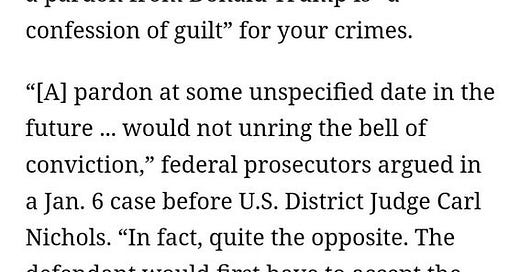We may not have seen the last of those controversial Zhou pardons. Pardons can involve legal complications for the recipients. A good post at FR highlights what’s involved in a pardon:
Burdick v. United States, 236 U.S. 79 (1915) - Pardons impute guilt, accepting them confesses guilt
The United States Supreme Court ^ | January 25, 1915 | United States Supreme Court
Here’s the easy to read digest of the legal technicalities of the 1915 Burdick case, but before you read the four points, this is what the Zhou DoJ is telling J6 defendants, which confirms what Burdick says:
So when Milley and others say how “grateful” they are for their pardons, they’re admitting that they committed crimes. With that in mind, here are the four points of Burdick:
1. The president MAY issue pardons pre-emptively for unknown crimes against the United States.
That means, of course, that the president can’t issue pardons for state crimes, only federal crimes. Think about that, Tony Fauci—you harmed people all across the nation.
2. The grant of a pardon imputes guilt to the person receiving the pardon.
3. Therefore, the recipient must accept the pardon for it to be valid, and accepting a pardon is a confession of guilt.
4. After accepting a pardon, the recipient loses their 5th Amendment protection against testifying.
As you can see, the recipient of a pardon cannot refuse to testify regarding any matter to which the pardon applies. Importantly, any false testimony is a new crime, and is not covered by the pardon. A pardon is not a stay out of jail in perpetuity card. It has become common for witnesses to claim lack of memory, but there are ways to make that difficult to do without entering into false testimony. I’m just saying that the pardon isn’t a total freebie—it comes with risks, if the government wants to push.
Also, a pardon for crimes committed doesn’t immunize you from a civil tort case. I won’t speculate on this because it’s way above my pay grade, but accepting a pardon could theoretically make a tort claim against you much easier to prove, since the burden of proof in civil cases is much lower than the “beyond a reasonable doubt” standard of the crime for which you were pardoned. Obviously, this all depends on the circumstances, but it’s something a pardon recipient might want to consider.
But there’s another neglected aspect to admitting your guilt of a crime. For example, the proceeds of criminal activity are often subject to seizure in civil forfeiture proceedings. Therefore, if the government tries to seize the proceeds of criminal activity that is covered by a pardon, acceptance of that pardon means you admit that you committed the crime in question. That makes forfeiture pretty much automatic, since the only real defense to the forfeiture action is to deny that a crime was committed. You can’t have it both ways—you either admit guilt or you deny guilt. If you deny it, you are refusing the pardon and are subject to criminal prosecution.
With that in mind, consider this:
Do unto Democrats ... @aimtomisb3hav3
Correct.
The pardons can be considered a gift. Biden listed where to put the crosshairs.
Compel testimony. Civil forfeiture. Civil lawsuit, potentially. IRS audit.
Woops!
Shipwreckedcrew @shipwreckedcrew
This is 100% true. The DOJ could move against ill-gotten gains in an civil forfeiture action using in rem jurisdiction.
Proceeds of illegal activity never lawfully belong to the person who possesses them because the acquisition of that property is the result of criminal activity and you cannot gain lawful ownership of property via criminal activity.
As a legal matter, ownership of property obtained via criminal activity automatically reverts to the U.S. because the illicit possessor cannot own it.
That is the legal theory behind civil forfeiture -- the Govt takes possession of property it claims ownership over, and the person who acquired the property must show that it derived from a lawful source or transaction.
So, as a theoretical matter, the fact that the Biden family is pardoned would not prevent DOJ from pursuing civil forfeiture against any property it could trace to illegal activity, whether the Bidens are subject to criminal prosecution or not.
As you can see from the following, having admitted guilt by accepting a pardon makes it extremely difficult to defend against the civil forfeiture case without rejecting the pardon:
Shipwreckedcrew @shipwreckedcrew
It does -- the Govt files a civil complaint and lays out the case that the Def. engaged in criminal conduct in order to acquire the property.
The Def has the opportunity to defend and show the Govt case is incorrect.
Most don't because the Govt case is usually correct.
This is FEDERAL civil forfeiture, not State civil forfeiture which is very often abused.
Again, all this depends on individual circumstances, the nature of the crimes, etc. But it does illustrate that accepting a pardon isn’t necessarily risk free.
Regarding people who committed torts by abusing their authority …





What do you say they should look at forfeiting those fat government pensions that Fauci and Milley have for starters?
Does that mean Fauci loses the royalties on SARS-CoV-2 patents and other payoffs from Pfizer and Moderna?